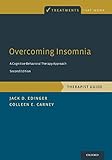Overcoming Insomnia : A Cognitive-Behavioral Therapy Approach : Therapist Guide / Jack D. Edinger, Colleen E. Carney.
Material type: TextLanguage: English Series: Treatments that workEdition: Second editionDescription: ix, 141 pages : illustrations ; 26 cmISBN:
TextLanguage: English Series: Treatments that workEdition: Second editionDescription: ix, 141 pages : illustrations ; 26 cmISBN: - 9780199339389
- 616.849 23 EDI
- WM 188
| Item type | Current library | Collection | Call number | Status | Date due | Barcode |
|---|---|---|---|---|---|---|
 General Books
General Books
|
CUTN Central Library Medicine, Technology & Management | Non-fiction | 616.849 EDI (Browse shelf(Opens below)) | Available | 33122 |
Machine generated contents note: -- Introductory Information for Therapists --Pre-Treatment Assessment-- Session 1: Psychoeducational and Behavioral Therapy Components --Session 2: Cognitive Therapy Comoponents --Follow-Up Sessions --Considerations in CBT Delivery: Challenging Patients and Treatment Settings --Sleep History Questionnaire --Daytime Insomnia Symptom Response Scale (DIRS).
Includes bibliographical references (pages 131-140).
"It is estimated that one in ten U.S. adults suffers from chronic insomnia. If left untreated, chronic insomnia reduces quality of life and increases risk for psychiatric and medical disease, especially depression and anxiety. The Overcoming Insomnia treatment program uses evidence-based cognitive-behavioral therapy (CBT) methods to correct poor sleep habits. CBT has been proven in multiple studies to improve sleep by reducing time spent in bed before sleep onset, reducing time spent awake after first sleep onset, and increasing the quality and efficiency of sleep. Developed by Jack D. Edinger and Colleen E. Carney, this second edition has been thoroughly updated according to the DSM-5, which now conceptualizes insomnia as a sleep-wake disorder, rather than a sleep disorder only. The DSM-5 has also eliminated the differentiation between primary and secondary insomnias, so this program provides an expanded discussion of daytime related issues as well as delivery issues specific to those with comorbid mental and medical problems. Patients are first given information about healthy sleep and the reasons for improving sleep habits, then a behavioral program is developed to address that patient's specific sleep problems. Use of a sleep diary, assessment forms, and other homework (all provided in the corresponding patient Workbook) allows client and therapist to work together to develop an effective sleep regimen tailored specifically for each client, and several sessions are dedicated to increasing compliance and problem-solving"--Provided by publisher.


There are no comments on this title.